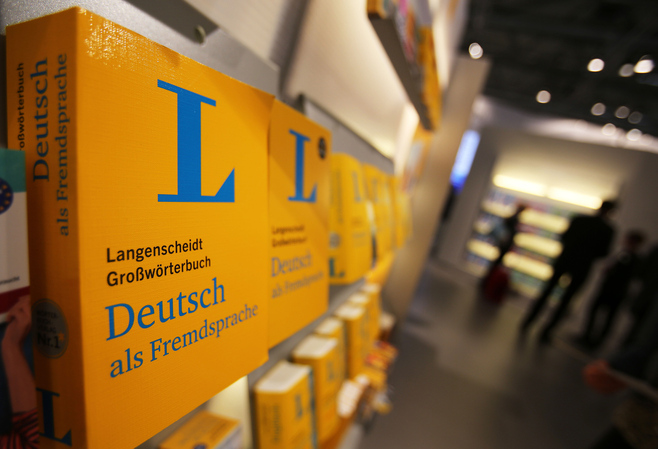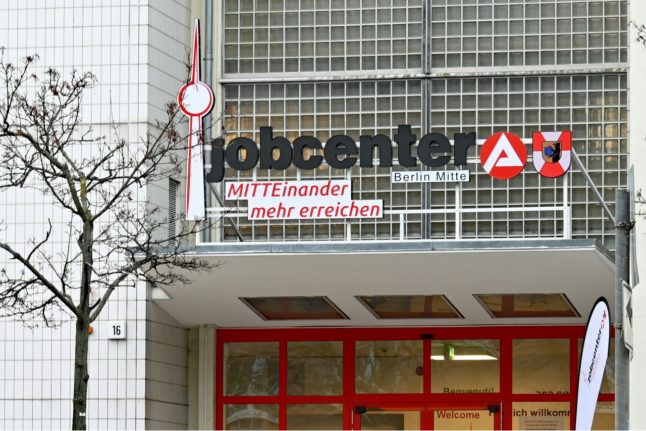9 ways to learn German for free in Berlin

Germany's capital is getting more and more expensive. But there are still many ways to learn German in Berlin for free - while getting to know the city better.
Among many foreigners, Berlin is a notoriously difficult place to learn German. With so many international residents and Germans who can seamlessly switch to English, it can be a challenge to perfect your Deutsch - or even speak it at all.
But there are still a myriad of ways to learn the language, and kostenlos at that. Bonus: you'll get to know Berlin better too.
READ ALSO: Six ways to fall in love with learning German again
Get a library card
There is no shortage of books, magazines, DVDs, and audio resources to learn German. But before you fill up your already-cramped flat or WG with them, why not just use them on a rotating basis without paying a euro? A card from Berlin's Staatsbibliothek, which allows you to access all of the city's libraries, does cost €30 for a year, but once you have it you'll have you access to all print and digital offers completely free of charge.
In most of Berlin's libraries, you can also access reading rooms and other resources completely free of charge, or get a card for €10 per year in order to take books and language tapes home with you.
Find a tandem partner
Many of us feel awkward when trying to speak a language we're learning with natives. The fear of making mistakes sometimes even stops us from trying at all.
That's where a tandem, or language exchange, partner comes in. You don't have to feel shy about stumbling in their mother tongue because they're most likely doing the same in yours. Typically you meet once a week in an informal setting, like a cafe, and take turns speaking in each person's respective language, giving feedback either during the chat or afterwards.

Dictionaries for German as a foreign language from Langenscheidt on a shelf in a book shop. These can also be checked out in any Berlin library. Photo: picture alliance/dpa | Oliver Berg
In Berlin there are numerous ways to find a tandem, some of the most popular being the Facebook group Language Tandem Berlin and the website Tandem.net. If you're a university student, you can even post a shout-out for a tandem on a message board.
Go to a meetup
Sometimes it's also fun to practice German with other non-native speakers, not to mention meet other international residents. Join Meetup.com to see a slew of free German-language get-togethers, or head to one sponsored by Easy German or SpeakEasy, where native speakers will also be on hand.
Go on a free walking tour
From learning about Berlin's graffiti art to the history of the city under National Socialism, there are a wide variety of walking tours to see the city's past through prominent and hidden sights and landmarks. If your German is already at an intermediate level - or you just want to get a feel for the language while being out and about - then one of these tours is a great resource. Guruwalk.com offers nearly 70 on various themes, auf Deutsch, all over Berlin.
Many of these are free to join, though guides will often expect to be tipped after the tour.

A walking tour in Berlin stops at the new Humboldt Forum building. Photo: picture alliance/dpa | Wolfgang Kumm
Travel outside of the Ring (or to the post office)
Don't give up if, upon trying to order a coffee auf Deutsch at cafe in Prenzlauer Berg, you're met with a stare and a "Sorry, mein Deutsch ist nicht gut" (if the barista even makes it that far) or a more abrupt: "Only English!". Many internationals in Berlin complain they can't practice their German either because there's simply no one to practice with or because well-meaning Germans automatically switch to English.
But that's usually within the very international-filled centre of the city. Head to the outskirts of Berlin (outside of the S-Bahn’ ‘Ring’) or to neighbouring Brandenburg, where locals aren't nearly as used to - or comfortable with - encounters in English. Even just ordering food at a restaurant or asking for directions in an environment where people (most likely) won't switch to English is helpful.
And even in the middle of Mitte, there's a good chance workers at any sort of bureaucratic institution (here's looking at you, post office) won't be keen to speak anything but Berliner Schnauze. Or on a good day, German, which will help you build up your day-to-day vocabulary.
READ ALSO: Berliner Schnauze: The 'rude' German attitude foreigners could learn from
Check with your employer (or the jobcentre)
Even if you work for a company where the main language is English - as is the case for many in Berlin - there's a chance that your employer might foot the bill for you to take a Deutschkurs, or even offer their own if it's a larger firm.
Both employees and freelancers are also eligible for five days of Bildungsurlaub (education holiday) per year. While an employer wouldn't pay for your time off of work, you'd receive normal wages during this period - just like when using up normal vacation days.

The jobcentre in Berlin Mitte. Photo: picture alliance/dpa | Philipp Znidar
In other cases, foreigners can be eligible for free language courses or integration courses paid for by the state, so it's worth doing your research on this by asking your case worker at the jobcentre or checking with your local Volkshochschule (VHS).
READ ALSO: Bildungsurlaub: What is Germany's 'education holiday' and how can I use it?
Visit a museum or the zoo
Berlin boasts an impressive 170 museums, according to the capital's tourism website. And a bulk of them are completely free of charge, if they're not already, on Museumssonntag, the first Sunday of each month.
Almost all of the larger ones feature descriptions in both German and English, sometimes side by side. Even comparing titles, whether of a work of art or animal names at one of the city's two sprawling zoos, will help you build up your vocabulary and get a feel of how concepts are expressed in German.
Speak, in the name of love…
Okay, this one is pretty obvious, but if you came to the capital uncoupled and are on the lookout for die Große Liebe (or just a, um, shorter lived cultural exchange), then meeting a native German native speaker is a certainly useful way to brush up your skills on a regular basis. Even if they do speak impeccable English, you'll want to get up to speed for when you meet their Oma who most likely isn't quite as well-versed, or just know what they're chatting with their Kumpels (mates) about.
READ ALSO: German word of the day: Die Große Liebe
Comments
See Also
Among many foreigners, Berlin is a notoriously difficult place to learn German. With so many international residents and Germans who can seamlessly switch to English, it can be a challenge to perfect your Deutsch - or even speak it at all.
But there are still a myriad of ways to learn the language, and kostenlos at that. Bonus: you'll get to know Berlin better too.
READ ALSO: Six ways to fall in love with learning German again
Get a library card
There is no shortage of books, magazines, DVDs, and audio resources to learn German. But before you fill up your already-cramped flat or WG with them, why not just use them on a rotating basis without paying a euro? A card from Berlin's Staatsbibliothek, which allows you to access all of the city's libraries, does cost €30 for a year, but once you have it you'll have you access to all print and digital offers completely free of charge.
In most of Berlin's libraries, you can also access reading rooms and other resources completely free of charge, or get a card for €10 per year in order to take books and language tapes home with you.
Find a tandem partner
Many of us feel awkward when trying to speak a language we're learning with natives. The fear of making mistakes sometimes even stops us from trying at all.
That's where a tandem, or language exchange, partner comes in. You don't have to feel shy about stumbling in their mother tongue because they're most likely doing the same in yours. Typically you meet once a week in an informal setting, like a cafe, and take turns speaking in each person's respective language, giving feedback either during the chat or afterwards.

In Berlin there are numerous ways to find a tandem, some of the most popular being the Facebook group Language Tandem Berlin and the website Tandem.net. If you're a university student, you can even post a shout-out for a tandem on a message board.
Go to a meetup
Sometimes it's also fun to practice German with other non-native speakers, not to mention meet other international residents. Join Meetup.com to see a slew of free German-language get-togethers, or head to one sponsored by Easy German or SpeakEasy, where native speakers will also be on hand.
Go on a free walking tour
From learning about Berlin's graffiti art to the history of the city under National Socialism, there are a wide variety of walking tours to see the city's past through prominent and hidden sights and landmarks. If your German is already at an intermediate level - or you just want to get a feel for the language while being out and about - then one of these tours is a great resource. Guruwalk.com offers nearly 70 on various themes, auf Deutsch, all over Berlin.
Many of these are free to join, though guides will often expect to be tipped after the tour.

Travel outside of the Ring (or to the post office)
Don't give up if, upon trying to order a coffee auf Deutsch at cafe in Prenzlauer Berg, you're met with a stare and a "Sorry, mein Deutsch ist nicht gut" (if the barista even makes it that far) or a more abrupt: "Only English!". Many internationals in Berlin complain they can't practice their German either because there's simply no one to practice with or because well-meaning Germans automatically switch to English.
But that's usually within the very international-filled centre of the city. Head to the outskirts of Berlin (outside of the S-Bahn’ ‘Ring’) or to neighbouring Brandenburg, where locals aren't nearly as used to - or comfortable with - encounters in English. Even just ordering food at a restaurant or asking for directions in an environment where people (most likely) won't switch to English is helpful.
And even in the middle of Mitte, there's a good chance workers at any sort of bureaucratic institution (here's looking at you, post office) won't be keen to speak anything but Berliner Schnauze. Or on a good day, German, which will help you build up your day-to-day vocabulary.
READ ALSO: Berliner Schnauze: The 'rude' German attitude foreigners could learn from
Check with your employer (or the jobcentre)
Even if you work for a company where the main language is English - as is the case for many in Berlin - there's a chance that your employer might foot the bill for you to take a Deutschkurs, or even offer their own if it's a larger firm.
Both employees and freelancers are also eligible for five days of Bildungsurlaub (education holiday) per year. While an employer wouldn't pay for your time off of work, you'd receive normal wages during this period - just like when using up normal vacation days.

In other cases, foreigners can be eligible for free language courses or integration courses paid for by the state, so it's worth doing your research on this by asking your case worker at the jobcentre or checking with your local Volkshochschule (VHS).
READ ALSO: Bildungsurlaub: What is Germany's 'education holiday' and how can I use it?
Visit a museum or the zoo
Berlin boasts an impressive 170 museums, according to the capital's tourism website. And a bulk of them are completely free of charge, if they're not already, on Museumssonntag, the first Sunday of each month.
Almost all of the larger ones feature descriptions in both German and English, sometimes side by side. Even comparing titles, whether of a work of art or animal names at one of the city's two sprawling zoos, will help you build up your vocabulary and get a feel of how concepts are expressed in German.
Speak, in the name of love…
Okay, this one is pretty obvious, but if you came to the capital uncoupled and are on the lookout for die Große Liebe (or just a, um, shorter lived cultural exchange), then meeting a native German native speaker is a certainly useful way to brush up your skills on a regular basis. Even if they do speak impeccable English, you'll want to get up to speed for when you meet their Oma who most likely isn't quite as well-versed, or just know what they're chatting with their Kumpels (mates) about.
READ ALSO: German word of the day: Die Große Liebe
Join the conversation in our comments section below. Share your own views and experience and if you have a question or suggestion for our journalists then email us at [email protected].
Please keep comments civil, constructive and on topic – and make sure to read our terms of use before getting involved.
Please log in here to leave a comment.